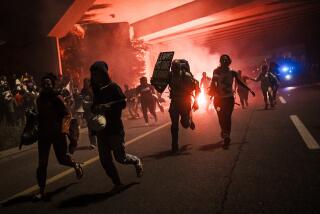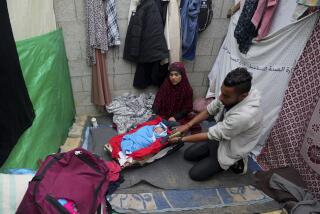Looting grows in lawless Egypt
CAIRO â Looting spread across Egypt and President Hosni Mubarak appointed a vice president as protesters swarmed into the streets for a fifth day, burning buildings, ransacking police offices and marching joyfully past tanks and soldiers.
Demonstrations aimed at ending Mubarakâs 30 years in power were eclipsed for many by a growing fear of lawlessness. After police retreated following clashes with protesters, vigilantes armed with sticks and knives patrolled Cairo neighborhoods. Reports spread that escaped prisoners and thugs from the ruling party were roaming the capital and other cities on motorcycles.
âWe were out guarding our neighborhood and we caught a number of people attempting to loot, including five carrying identification cards from the Interior Ministry,â said Kamal Banna, a labor activist from Suez, the scene of some of the most violent battles between security forces and protesters since the nationwide revolt began Tuesday.
State television reported that 62 people had been killed in clashes during the preceding two days.
In a speech early Saturday, the 82-year-old Mubarak had refused to step down but said he was asking for the resignation of the entire government.
Later in the day, he appointed Ahmed Shafik, minister of civil aviation and a retired air force general, as prime minister and Omar Suleiman, head of intelligence, as vice president. It is the first time that Mubarak has had a vice president.
In Suleiman, Mubarak is turning to a trusted ruling-party ally during one of the nationâs worst political crises. The former spy chief is respected by the West and regarded as a skilled diplomat. He has for years been Egyptâs main negotiator with the Palestinians, and he was credited with taking security measures on a visit to Ethiopia in 1995 that saved Mubarak from assassination.
He has the military background that has defined Egyptian leaders since Gamal Abdel Nasser seized power in a 1952 coup. His appointment also suggests that Mubarakâs son Gamal, whom many regarded as a likely successor, may, at least in the short term, not be in contention. Mubarak was vice president in 1981 when he took power after the assassination of Anwar Sadat.
âAny prospects of succession are now over,â said Mustafa Labbad, director of Al Sharq Center for Regional and Strategic Studies, referring to Mubarakâs son. But the protests have changed Egypt enough that the 74-year-old Suleiman could be no more than a transitional figure.
âEgyptians will not accept Suleiman as leader of the country after Mubarak because of his connection to the old regime,â Labbad said.
Others view Suleiman as a wise political choice.
âWhen you end the Mubarak regime,â said Hisham Kassem, a journalist and political analyst, âyou will need a powerful man during the transition, and he is a powerful man.â
The appointments of Shafik and Suleiman did little to appease tens of thousands of protesters or Nobel laureate Mohamed ElBaradei, the former head of the International Atomic Energy Agency, who for many has come to symbolize the opposition movement.
âThis is a change of personnel, and we are talking about the change of a regime,â ElBaradei told Al Jazeera satellite television channel.
âThe Egyptian people are saying one thing: President Hosni Mubarak must leave. We have to move toward a democratic state.â
But there was no clear indication how the opposition, including ElBaradei, the Muslim Brotherhood and protest organizers such as the April 6 youth movement, was going to turn mass street demonstrations into a strategically unified force.
Throughout the region Saturday, the unrest in Egypt continued to rivet people tired of repressive, corrupt rulers. In Iran, a Persian-majority nation, students demonstrated to show their support for protesters in Egypt, Tunisia and other Arab countries. Demonstrations in support of the Egyptian movement were also held in Lebanon and Yemen.
The Obama administration kept a careful watch on developments in Egypt, a key ally that has received billions of dollars in U.S. aid. Obama made his high-profile appeal for better relations with the Islamic world less than two years ago in Cairo. But he has been hoping to focus now on the American economy, ending U.S. involvement in Iraq and gaining the upper hand in Afghanistan.
In Cairo, demonstrators gathered for a second day outside the Interior Ministry, home of the much-reviled police. Security forces inside the ministry shot and killed three demonstrators. Across much of the capital and in other cities, protests were intense if a bit smaller than on Friday.
The headquarters of the ruling National Democratic Party, set alight Friday, continued to burn. Curators of the adjacent Egyptian Museumâs ancient artifacts feared that the treasures could be damaged if the party headquarters collapsed on the museum.
Army troops secured the museum and its grounds early Saturday after young Egyptians armed with clubs set up a protective cordon. But before these measures were taken, vandals had gotten inside and torn the heads off of two mummies, antiquities director Zahi Hawass told the United Arab Emirates-based Al Arabiya news network.
Outside the museum, demonstrators chanted: âWake up, Mubarak! This is your last day in power!â
Their rage, however, had over the previous 24 hours been calmed by tanks and soldiers of the countryâs respected military. Protesters laughed and joked with soldiers, posing for pictures with one another while raising Egyptian flags.
The army had filled a vacuum left by retreating police officers, who camped wearily in neighborhoods and along the Nile corniche, where charred cars sat along roadsides.
Though many demonstrators expressed contempt for the police and viewed their absence as a victory, others accused the government of withdrawing security forces in a cynical attempt to spark anarchy and violence.
Khalid Labban, 32, who lives in the western part of Cairo, said he rushed out of his home Saturday afternoon to defend a neighborhood retail shop from gangs trying to break in with clubs.
âMy hand is swollen from having to swat people away,â he said.
Gunfire rattled across neighborhoods, and some residents padlocked their doors. Foreigners called one another for advice and contemplated leaving the country. Hotels boarded their entrances.
The mood across the capital was one of uncertainty over where the revolt, inspired by the Tunisian uprising that this month toppled President Zine el Abidine ben Ali, would veer next.
âThe government is trying to transform the peopleâs revolution into looting mobs so they can justify cracking down,â said Cairo University professor Mahael Said, 51, who had been participating in the street protests since Friday.
âBut we are not going to let them do that.â
Amro Hassan of The Timesâ Cairo Bureau, special correspondent Doha al Zohairy in Cairo and Times staff writer Carol J. Williams in Los Angeles contributed to this report.
More to Read
Sign up for Essential California
The most important California stories and recommendations in your inbox every morning.
You may occasionally receive promotional content from the Los Angeles Times.









